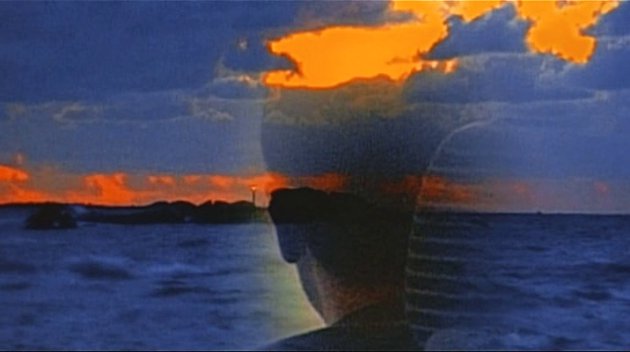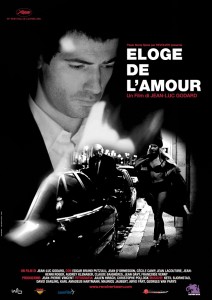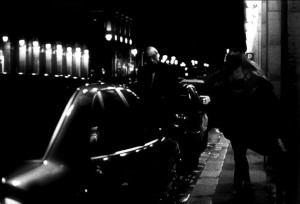Eloge de L’Amour, as the title suggests, has the feel or tone of a eulogy: a meditation on cinema, love and art. The story is completely non-linear and incredibly dense. Each scene, every image in fact, contains so much information that it becomes impossible to decode even on several viewings and through different (French and Scottish) cultural positions.
Perhaps the plot is simply a vehicle here for Godard’s concerns that the corporate capitalist monster will destroy cinema, destroy humankind and destroy love.
The film is beautifully shot but deliberately difficult to follow: the first half is filmed in lush black and white and supposedly concerns a project about the four phases of love (meeting, attraction, separation, reconciliation) while the second part takes place earlier and is shot in saturated digital colour. But the digital experimentation of video juxtaposed with the nostalgic black and white film is just one of many filmic ideas explored in metalevels. In the film’s hermetic inner world, Godard asks a lot of the viewer: referring to American cinema, to his own oeuvre and to history and to all stories and their possibilities.
Released in 2001, the film is aggressively anti-American (as if the corporations and the USA were conflated), accusatory, and even suggests that Americans have no past of their own, no history. Possibly Godard is referring to mythologizing and to re-examining the past or reinventing the self. Certainly America encompasses both North and South, and taken separately the points the characters make seem trivial, even petty, particularly the attack on Steven Spielberg for Schindler’s List.
The subjects Godard addresses: the Holocaust, the French resistance, corporate control, are still raw, but there is a deliberate distancing: if clarity surfaces, then narratives are overlaid, obscuring, obfuscating, thus making immediate comprehension impossible yet deepening absorption.
There can be no doubting Godard’s cinematic mastery and technique: this is a hauntingly beautiful film. Yet the actors do not act like actors, they seem different even from real people and the narrative fragments, the characters mutter philosophical aphorisms such as: “there is no death… when it comes there is always a sense of self… moi… moi.” Connecting textual elements seem out of sequence, out of phase and out of synch and blank, black screens appear at random.
It sounds convoluted, and indeed it is, but the soundtrack is filled with sweet piano and strings and somehow through multilayered mumblings, Eloge de L’Amour elicits powerful emotions and the effect is overwhelming.
John Chalmers is one-half of the duo known as “Metaphrog,” along with Sandra Marrs.
______________
The index to the Godard roundtable is here.




